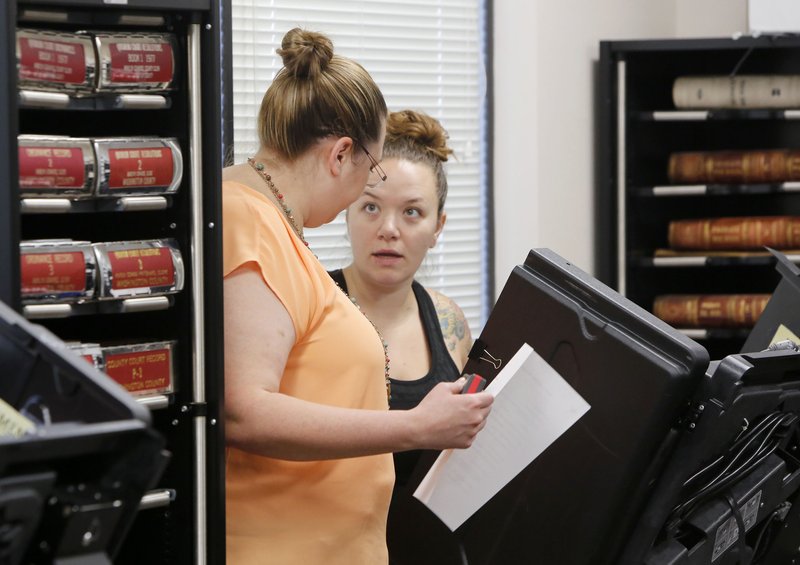FAYETTEVILLE -- With early voting well underway Tuesday in Fayetteville, Arkansas Attorney General Leslie Rutledge issued an opinion saying the proposed Uniform Civil Rights Protection ordinance -- and several other anti-discrimination measures across the state -- violate Arkansas law and, thus, are unenforceable.
State Rep. Bob Ballinger, R-Hindsville, asked Rutledge last month whether Act 137, a law state lawmakers approved earlier this year, would prevent the adoption or enforcement of ordinances in Fayetteville, Eureka Springs, Hot Springs, Little Rock and Pulaski County meant to protect LGBT residents from discrimination.
Web Watch
Go to nwadg.com/documents to read a copy of Arkansas Attorney General Leslie Rutledge’s opinion.
Source: Staff Report
The law, which Ballinger sponsored in the Arkansas House of Representatives, restricts cities and counties from enacting or enforcing "an ordinance, resolution, rule or policy that creates a protected classification or prohibits discrimination on a basis not contained in state law."
The Arkansas Civil Rights Act of 1993 prohibits discrimination on the basis of race, religion, gender, national origin and disability but not based on someone's sexual orientation or gender identity. However, another section of state law dealing with bullying in public schools does mention sexual orientation and gender identity.
Fayetteville City Attorney Kit Williams and Little Rock City Attorney Tom Carpenter have argued, therefore, those protections have a legal basis and can be included in municipal ordinances.
Rutledge disagreed in her opinion Tuesday.
"The anti-bullying statute is not a nondiscrimination law as contemplated by Act 137," she stated, adding, "Even if one assumed, for purposes of argument, that the anti-bullying statute is a nondiscrimination law ... Act 137 holds the field with respect to nondiscrimination laws.
"Thus, if the local ordinances vary at all from state laws that prohibit nondiscrimination, then the local ordinances are preempted by Act 137."
Ballinger praised Rutledge's opinion Tuesday.
"I felt like a reasonable analysis of the law would come back with this conclusion," he said. "I really think that it was extremely well-written. It kind of was what I expected."
Williams stuck to his initial interpretation.
"The protected classifications are certainly there in state law, and, therefore, this is not a new protected classification," Williams said.
Both Williams and Danielle Weatherby, an assistant law professor at the University of Arkansas and legal counsel for the pro-ordinance For Fayetteville campaign, both questioned the timing of Rutledge's opinion Tuesday.
"I believe the issuing of her opinion is a move to stonewall voters and to jeopardize the political process," Weatherby said. "I encourage voters to disregard this opinion -- I don't think it has any real weight -- and to go out and vote on the merits of this ordinance."
While Rutledge is the top law enforcement official in the state, Williams said, "She really has no precedential value. She's just like another attorney in most cases."
"I've always felt like this is going to have to be decided in the courts, and that's where I think it's going to go," he added.
Ballinger acknowledged Rutledge's opinion is just that: an opinion. But, he added, the attorney general's office "is the biggest law firm in the state, essentially, and it's their job to interpret state code."
Rutledge's opinion isn't "binding legal precedent," Ballinger said. "However, the law and rationale behind it is as solid as it gets."
Judd Deere, a spokesman for the attorney general's office refuted the idea Rutledge's opinion was strategically timed to influence Fayetteville's Sept. 8 election.
"We make every effort to turn opinion requests around within 30 days, but sometimes it takes longer depending on what else is already in the queue," Deere said by email.
Meanwhile, early voting will continue today through Friday in the Washington County Clerk's office on the third floor of the County Courthouse, 280 N. College Ave.
According to County Clerk Becky Lewallen, more than 920 residents cast ballots on Tuesday, the first day of early voting. That's roughly 100 more voters than in December, when a similar anti-discrimination law the City Council had passed was repealed.
On Monday, Protect Fayetteville, the group advocating against Fayetteville's Uniform Civil Rights Protection ordinance, filed a lawsuit in Washington County Circuit Court seeking a permanent injunction blocking the Sept. 8 special election. One of the group's claims was that the city's Uniform Civil Rights Protection ordinance violates Act 137.
"Protect Fayetteville agrees with the Arkansas attorney general that Act 137 prohibits the city of Fayetteville from adopting Ordinance 5781," said Wendy Campbell, secretary of the group, in a prepared statement Tuesday.
Washington County Circuit Judge Doug Martin is scheduled to hear arguments in the case Friday.
Williams didn't file a response to Protect Fayetteville's lawsuit Tuesday but said he questions the constitutionality of Act 137.
He cited a 1996 case in which the U.S. Supreme Court ruled a Colorado constitutional amendment was invalid. The amendment sought to prohibit laws creating a new protected class for LGBT residents.
Williams said that Act 137, like the law referred to in the 1996 case, violates the equal protection clause in the U.S. Constitution's 14th Amendment.
Ballinger disagreed.
He said Act 137 was needed to prevent a patchwork of nondiscrimination laws that vary from city to city.
"The attorney general's analysis is based on solid law," Ballinger said.
Eureka Springs Mayor Robert "Butch" Berry also referred to the 14th Amendment to the U.S. Constitution as saying states may not deny residents equal protection under the law.
"If I was a law professor, I'd give her an A for creativity," Berry said of Rutledge's opinion. "Rep. Ballinger didn't ask her whether she thought this act was constitutional or not, so she doesn't address that issue. I still feel that Act 137 is unconstitutional."
Berry said Eureka Springs will also continue to enforce its anti-discrimination ordinance, "if we get a complaint."
NW News on 09/02/2015

